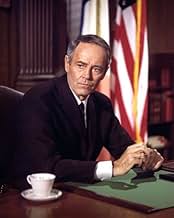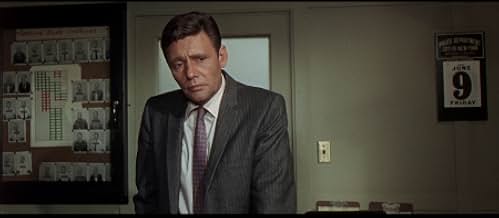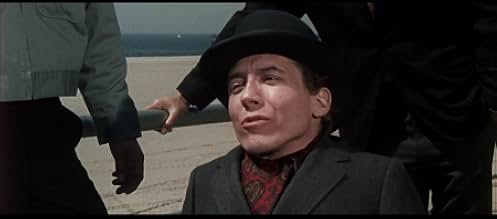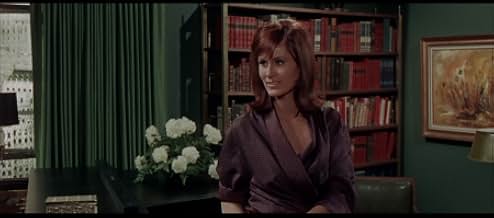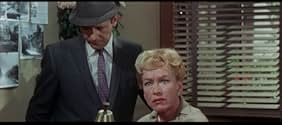NOTE IMDb
6,5/10
4,3 k
MA NOTE
Dans le Harlem espagnol de New York, les supérieurs des détectives Madigan et Bonaro leur ont donné 72 heures pour capturer un voyou recherché pour homicide à Brooklyn.Dans le Harlem espagnol de New York, les supérieurs des détectives Madigan et Bonaro leur ont donné 72 heures pour capturer un voyou recherché pour homicide à Brooklyn.Dans le Harlem espagnol de New York, les supérieurs des détectives Madigan et Bonaro leur ont donné 72 heures pour capturer un voyou recherché pour homicide à Brooklyn.
- Réalisation
- Scénario
- Casting principal
Avis à la une
This is a very good film--full of excellent acting and a pretty interesting story. Richard Widmark and Henry Fonda are both wonderful actors in the movie and their stories run parallel during most of the film--having almost no interaction in the film. Harry Guardino, Inger Stevens, James Whitmore and others provide some superb support and the film is very entertaining. In many ways it's like a 1960s take on Film Noir, though with slightly less "gritty" dialog and a lot of late 60s sensibilities (a bit of nudity and graphic language that at first took me by surprise). Now this isn't to say that the film is needlessly gratuitous. I just had a hard time, at first, hearing some of the swearing coming out of the mouths of some old-time actors. Additionally, and this did NOT improve the film for me, there were some soap opera-like elements thrown in that often didn't work. Having widower Fonda sleeping with a married woman who had kids just seemed sleazy and didn't at all fit with the character they had created. He prided himself on his decency and integrity, but this didn't seem to make much sense. However, the tension between Widmark and his wife, Stevens, did work pretty well, as you could certainly see how being a detective could really be tough on a marriage.
All in all, this was a very good film that seemed a little like DRAGNET, the TV show POLICE STORY and a soap opera all rolled into one. Good stuff that is well worth seeing, though I'd hesitate to let younger kids view this DVD.
All in all, this was a very good film that seemed a little like DRAGNET, the TV show POLICE STORY and a soap opera all rolled into one. Good stuff that is well worth seeing, though I'd hesitate to let younger kids view this DVD.
Detective Daniel Madigan (Richard Widmark) and Detective Rocco Bonaro (Harry Guardino) enter a squalid Manhattan apartment building to pick up Barney Benesch (Steve Ihnat), who is wanted for questioning on a case in Brooklyn. When Benesch manages to take Madigan and Bonaro's guns away and escape, Police Commissioner Anthony X Russell (Henry Fonda) tells them that they have 72 hours to get Benesch back, or else.
Out of all of the Don Siegel-directed films I've seen to date, this was the biggest disappointment. The film begins and ends with fantastic action sequences--well directed, well shot, with a nice, gritty feel, but in between the film felt overlong, overly complex, and far too soap-opera-like for my tastes.
It could be due to Madigan being adapted from a novel, but Abraham Polonsky and Howard Rodman's ("Henri Simoun" here) script includes so many different threads, most of them inconsequential to the outcome of the film, that it almost begins to lose coherence in the middle. It's a bad sign when the major arc of the story is completed, but characters still have to engage in a number of "But what about so and so?" verbal tags at the end of the film to try to satisfy the audience.
It feels almost as if Madigan is made for two entirely different crowds--one, fans of gritty crime action films, and the other, fans of realist dramas cum soap operas. I can't imagine the former caring about most of the material in the middle (unless it had a pay off towards their genre), and I can't imagine the latter being interested in the action scenes. Most of the material in the middle, although it has some more than admirable dialogue and decent performances, hinges on a complex web of personal and professional relationships--various romantic affairs, questionable relations between the police and citizens, and so on. It all comes to naught in the end. Also not helping is Henry Fonda's odd aloofness. Again, it might work if it had some other payoff, but it doesn't.
Still, the positive aspects were good enough to not bring my score below a 6. The film might also play better on a second viewing, where you better know how to adjust your expectations as it goes along. On a first, uninformed viewing, the beginning is likely to gear you up for a great, suspenseful and witty ride, leaving you disappointed in the middle, until you finally adjust and then you're awakened again with action at the end.
Out of all of the Don Siegel-directed films I've seen to date, this was the biggest disappointment. The film begins and ends with fantastic action sequences--well directed, well shot, with a nice, gritty feel, but in between the film felt overlong, overly complex, and far too soap-opera-like for my tastes.
It could be due to Madigan being adapted from a novel, but Abraham Polonsky and Howard Rodman's ("Henri Simoun" here) script includes so many different threads, most of them inconsequential to the outcome of the film, that it almost begins to lose coherence in the middle. It's a bad sign when the major arc of the story is completed, but characters still have to engage in a number of "But what about so and so?" verbal tags at the end of the film to try to satisfy the audience.
It feels almost as if Madigan is made for two entirely different crowds--one, fans of gritty crime action films, and the other, fans of realist dramas cum soap operas. I can't imagine the former caring about most of the material in the middle (unless it had a pay off towards their genre), and I can't imagine the latter being interested in the action scenes. Most of the material in the middle, although it has some more than admirable dialogue and decent performances, hinges on a complex web of personal and professional relationships--various romantic affairs, questionable relations between the police and citizens, and so on. It all comes to naught in the end. Also not helping is Henry Fonda's odd aloofness. Again, it might work if it had some other payoff, but it doesn't.
Still, the positive aspects were good enough to not bring my score below a 6. The film might also play better on a second viewing, where you better know how to adjust your expectations as it goes along. On a first, uninformed viewing, the beginning is likely to gear you up for a great, suspenseful and witty ride, leaving you disappointed in the middle, until you finally adjust and then you're awakened again with action at the end.
A decent exploration of the maverick detective theme that Siegal would examine more successfully in "Dirty Harry." Richard Widmark is terrific in the title role, and the cinematography, along with some of the dialogue, is top notch. The film runs into problems, however, with the subplot involving police commissioner Henry Fonda, as well as Madigan's difficulties on the homefront with wife Inger Stevens. Had the emphasis remained on the manhunt conducted by Madigan and his partner (Harry Guardino), it could have been a classic. Instead, too much time is devoted to talk, and as any Siegal enthusiast knows, action is what he did best. The later TV series, again starring Widmark, is superior.
Directed by Don Siegel who had a foot firmly planted in classic Hollywood and who was also a trailblazer in modernizing American action films, "Madigan" serves the perfect bridge between the two. Co-written by Abraham Polonsky, who'd previously been on the Hollywood Blacklist for refusing to testify before the House Un-American Activities Committee, the film follows two different NYPD police officers. One is Madigan, a tough no-nonsense detective played by Richard Widmark trying to catch a killer, and the other is the straight-arrow police commissioner, Henry Fonda, who's balancing justice, politics, and an extra-marital affair. The film was based on a book titled "The Commissioner" and Fonda's character was the original focus of the story, but the producers instead changed the focus to Widmark's Madigan character, so the film unfortunately ends up a an odd combination of two different stories. Both Fonda and Widmark's stories involve them having to balance their work-life and home-life, but neither of those story elements seemed all that interesting. The most interesting part of the story concerned Widmark and his partner, Harry Guardino, on the trail of criminal Steve Ihnat. Watching Widmark and Guardino push the boundaries of acceptable law enforcement in their investigation makes this film an interesting bridge to director Don Siegel's controversial and highly influential vigilante cop film "Dirty Harry" he'd make a few years later. Siegel also makes great use of NYC locations that give ether film added grit and realism, much like we'd later see in William Friedkin's "The French Connection" and Siegel's use of San Francisco in "Dirty Harry." Siegel also skillfully demonstrates his own directional action sequences chops with a memorable showdown in the film's finale, which features with three characters in tight quarters, all with John Woo-style double-fisted pistols in each hand. Overall, "Madigan" features an old style police detective story (with a nice plot nod to Kurosawa's "Stray Dog") that abandons the stylistic German Expressionist roots of American film noir and instead takes the genre into new more realistic and gritty of territory, even if those stronger elements get somewhat undone by dull and unoriginal subplots involving the marital lives of Madigan and the commissioner.
This is a very "late '60s" detective drama, and if you're in the mood, it will hit the spot.
What struck me, and it has not been picked up by other posters, is the very visible difference between the majority of the scenes, shot on authentic NYC locations, and a few scenes straight from the Universal backlot, on urbanistically nonsensical streets with no gutters.
The studio shot scenes (and the school-of-Lalo-Shifrin score) increase the impression that you are watching a first class TV movie. It all makes you hungry for a dinner in a foil tray.
Definitely entertaining, in a period way.
What struck me, and it has not been picked up by other posters, is the very visible difference between the majority of the scenes, shot on authentic NYC locations, and a few scenes straight from the Universal backlot, on urbanistically nonsensical streets with no gutters.
The studio shot scenes (and the school-of-Lalo-Shifrin score) increase the impression that you are watching a first class TV movie. It all makes you hungry for a dinner in a foil tray.
Definitely entertaining, in a period way.
Le saviez-vous
- AnecdotesAfter years of rejecting offers to star in a TV series, Richard Widmark finally succumbed to Universal and NBC-TV's offer for a series. The pilot, La dernière enquête (1973). was rejected, however, and Widmark was asked to play Madigan in a segment of the NBC Wednesday Mystery Movie during the 1972-73 season. The series was canceled after one season despite usually finishing in the top 30 of the Nielsen ratings.
- GaffesWhen the killer is located in a hotel room, the police mass in view of the window rather than around the other side of the building. Then while the killer is firing from the window the assault group run into the building on the side under fire from the window. They evacuate the floor of the killer's room well after the first shots are exchanged and no police are watching the door to prevent escape.
- Citations
Commissioner Anthony X. Russell: [after Kane drops his shield on Russell's desk] What am I supposed to do with that?
Chief Insp. Charles Kane: Commissioner, I thought you'd never ask.
- ConnexionsFeatured in Mask (1985)
Meilleurs choix
Connectez-vous pour évaluer et suivre la liste de favoris afin de recevoir des recommandations personnalisées
- How long is Madigan?Alimenté par Alexa
Détails
- Date de sortie
- Pays d’origine
- Langue
- Aussi connu sous le nom de
- Madigan (Police sur la ville)
- Lieux de tournage
- 107 East 98th Street, Manhattan, Ville de New York, New York, États-Unis(Barney Benesch's sleazy residence; area of first chase scene)
- Société de production
- Voir plus de crédits d'entreprise sur IMDbPro
- Durée1 heure 41 minutes
- Couleur
- Rapport de forme
- 2.35 : 1
Contribuer à cette page
Suggérer une modification ou ajouter du contenu manquant

Lacune principale
By what name was Police sur la ville (1968) officially released in India in English?
Répondre

